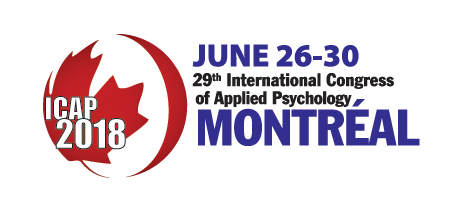2018 Pre-Congress Workshop 13: Inter-Professional Collaboration in Sport Psychology: Achieving Synergy Between Clinical Psychologists and Mental Performance Consultants
Jun 24, 2018 08:30AM
Palais des congrès de Montréal

| Presented by: | Shaunna Taylor, Daphné Laurin-Landry, Heidi Malo |
| Sponsored by: |
Sport and Exercise Psychology Canadian Sport Psychology Association |
| Continuing Education Credits: | 3.25 |
| Notes: |
- |
| Cost: |
CPA/IAAP Members: $195.00 + GST + QST Non-Members: $275.00 + GST + QST
Click here to download the country list |
| Duration: | Half Day (8:30 – 12:00) |
| Target Audience: | Clinicians and students who work or foresee working with athletes. |
| Skill/Difficulty Level: | Intermediate Level |
|
Workshop Description: Psychological intervention is increasingly showcased in Olympic Games media coverage, from Rio 2016 to Pyeongchang 2018. Yet a majority of sport psychology consultants in Canada are mental performance consultants rather than licensed psychology clinicians (Salmela, 1981; Woolway & Harwood, 2015). The first have a background in Kinesiology and/or in Sport Science and seek certification by the Canadian Sport Psychology Association, while the latter undergo classic training in clinical psychology and seek extra coursework in sport science. Mental performance consultants work at the front line when athletes require help in their mental game. They must, however, work in close collaboration with psychologists when performance meets mental health. Inter-professional collaboration is an underestimated aspect of the sport psychology practice despite its central importance for the excellence, personal growth and well-being of athletes. In this workshop, a series of tools developed in collaboration by psychologists and mental performance consultants will be presented around two objectives. Combining a Cognitive-Behavioral Therapy approach and ecological (Bronfenbrenner, 1977, 1986) and talent development perspectives (Côté, Hancock, & Abernethy, 2014; Laurin-Landry, 2018), participants will be taught: 1) how to evaluate demands in mental preparation and psychology and 2) how each professional’s services are combined synergistically. Specific learning goals stemming from these two objectives will be articulated around three clinical cases and the participants’ engagement in the discussion. In each clinical case, the complementarity of each expertise will be highlighted and the difficulties encountered will be discussed. Ethical questions associated with work in the sport industry will also be addressed specifically, as the practice of psychotherapy is supervised by a professional order in Quebec. By the end of the workshop, participants will be able to clearly identify respective roles and strengths of each professional, understand how they can complement each other’s intervention, and anticipate when referral is required. An outline of the sport psychology assessment procedure will also be offered to participants. |
|
|
Learning Outcomes:
|
|

